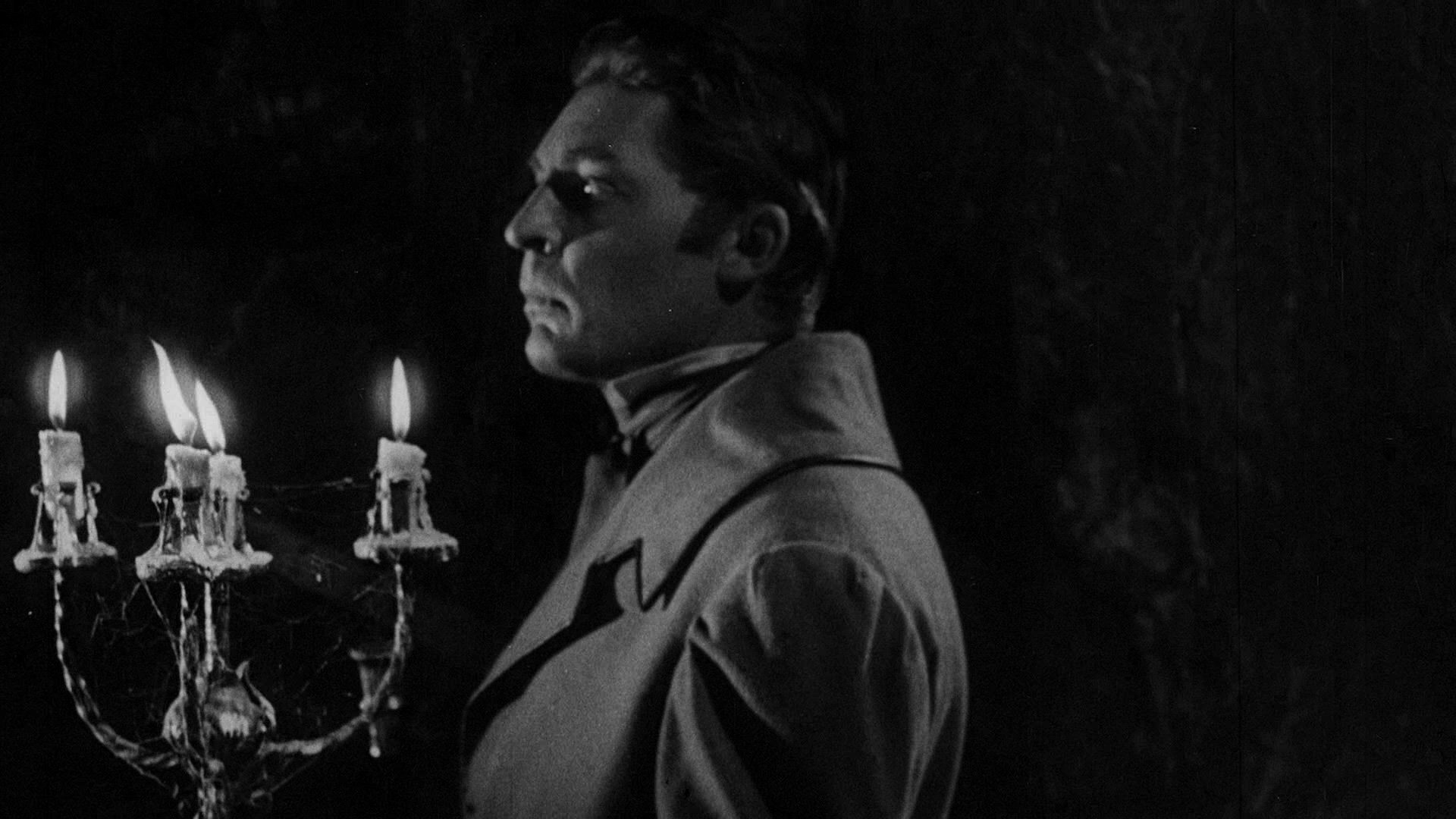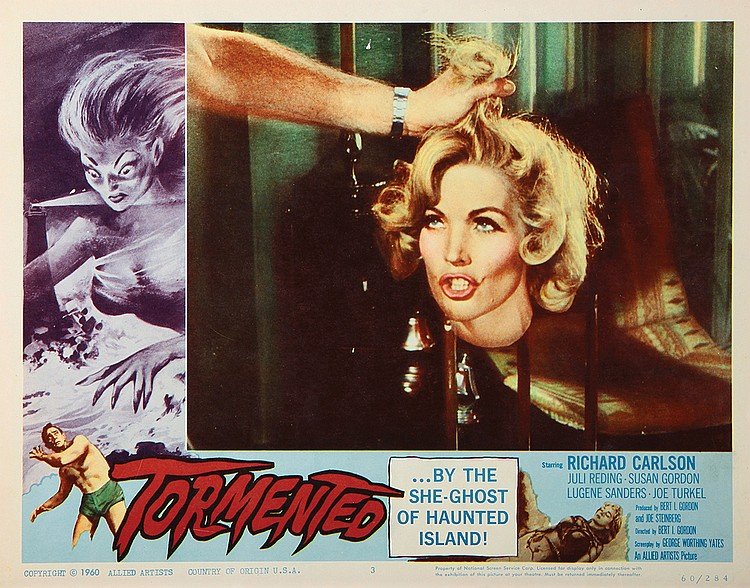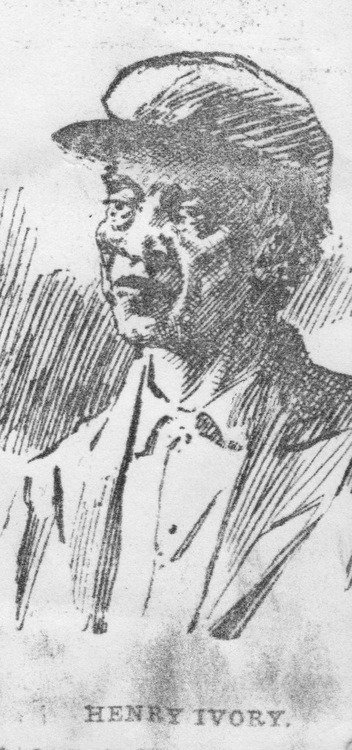
Laughter in Hell
Long assumed to be lost, Laughter in Hell has been disinterred from the Universal vaults, still potent and pungent. This quick and dirty, 70-minute tour of man’s (and woman’s) inhumanity to man had a re-premiere at San Francisco’s majestic Castro Theatre during the 2013 Noir City festival, in a setting of gilded Corinthian columns and elegant rococo murals. It will be screened again on February 26 as part of Film Forum’s series devoted to the year 1933, on a triple bill with 20,000 Years in Sing Sing and Rowland Brown’s lurid, terrific Blood Money. This program ought to come with a health warning, or perhaps with William Carlos Williams’s famous admonition to readers of “Howl”:
“Hold back the edges of your gowns, Ladies, we are going through hell.”

Lagerhead Quinlavan
When he was a lad in the tough Yorkville section of Manhattan, Jimmy Cagney ran with a group of poor slum kids sporting nicknames like “Picky,” “Lagerhead” and “Specs.” One of them, Pete Heslin, was nicknamed “Bootah” on account of the over-sized boots he wore. Bootah used to prove how tough he was by hanging off rooftops by his fingertips. Later, he proved how tough he was by becoming a drug addict and killing an off-duty cop during an armed robbery. In 1927, he was sent to Sing Sing and died in the electric chair. Any resemblance between Bootah and Cagney’s portrayal of Rocky Sullivan in Angels with Dirty Faces is purely intentional.
by Jim Knipfel
Drawing by Tony Millionaire
Excerpted from Daniel Riccuito’s The Depression Alphabet Primer

The Creeping Eye
But art and love are a matter of mouths open in cinnabar, of blackness and redness turned to velvet by assiduous grinding, of understanding the colors that benefit from being rubbed softly one into the other: the least that the practice will make you is skillful: beyond which there’s originality… This is all in Cennini’s handbook for painters, as well as the strict instruction that we must always take pleasure from our work.
— Ali Smith, How to Be Both
Georges Rivière is haughty. Like he smelled something bad. The script?
Here, in 1964’s Castle of Blood, playing a penurious dandy silly enough to spend the night in a haunted castle on a bet, Rivière seems to think aloofness will be all the protection he needs. It won’t be! Indeed, only one thing can save the film’s leading man from the visual shibboleths of a dying genre, and that’s the cameraman.

Who Are These Boxcar Boys and Girls?
Looking back at it, it seems to me that I was blown here and there like a dead leaf whipped about by the autumn winds…
Jack Black – his middle name was Chisel.
A bleak background! Crowded with robberies, burglaries, and thefts too numerous to recall. All manner of crimes against property. Arrests, trials, acquittals, convictions, escapes. Penitentiaries! There may even lurk an old corpse, compounding the endless felonies we know about, quietly decomposing in some hectic corner of life on the run. Poetic to imagine that when Jack’s memoir appears in 1926, the blood of his anonymous victim cries out, like a harbinger of doom. You Can’t Win – millions would need convincing.

Summer of ‘32
In the year of Our Lord, 1924, a bill passed by the United States Congress, then signed into law by President Calvin Coolidge, granted veterans of the First World War “Adjusted Service Certificates”. It was thought a good idea. The certificates were, essentially, souvenirs; warrants of recognition for honorable duty in the defense of these United States that could, if the bearer so chose, be redeemed for a fistful of cold, hard cash after a maturation period of twenty years. It was a bonus, in other words; the kind one always receives in grateful tribute from one’s employer for any job worth doing done well. In less than a decade, however, the unfiltered reality of Capitalism, American Style, soon dawned on everyone, and as a result the country found itself plunged into the sort of full-scale economic depression no one makes movies about anymore.
In June of 1932, some 15,000 veterans from across the nation – carrying with them their wives, their children and greater or lesser degrees of desperation – gathered as one in Washington, D.C. to petition that same United States Congress to enact legislation that would in effect force the War Department to do away with the maturation cycle and cough up the bonuses … now. Sponsored enthusiastically by the great Texas populist Wright Patman (who, some 40 years thereafter, would conduct the earliest Congressional inquiries into the abyss of mendacity that was Richard Nixon’s 1972 Presidential campaign), the bill sailed through the House, then struck a reef in the Senate where, by its very nature, it was pronounced Dead On Arrival. In the meantime the petitioners, assuming style and title of The Bonus Expeditionary Forces, dug themselves in along the banks of the Anacostia River for the long haul, constructing a vast encampment of makeshift housing that announced to everyone with eyesight that The Bonus Marchers had no intention of leaving the nation’s capitol without seeing their grievances redressed; just like it says in the Constitution. In honor of Washington’s Chief Executive, they called these do-it-yourself cities Hoovervilles.Within a month’s time, President Herbert Hoover, unflattered by the honor and recognizing that the “depleted federal treasury” line really wasn’t fooling anybody, asked the marchers to please go back where they came from. Congress suddenly snapped into action and kicked loose just enough money for carfare, and some of the marchers did take flight. But when the sweeping generosity of Washington’s gesture failed to enchant the majority, the always-relaible D.C. Police were sent in to break some heads, while newspapers began the standard cycle of dark speculation on the presence of Anarchists, Communists and other “foreign radicals” in sinister control of Bonus Marcher ranks. The protest, despite the weight of this harassment, endured. On July 28, requesting that “all humanity consistent with the due execution of this order” be used, President Hoover asked Army Chief of Staff, Gen. Douglas MacArthur to clear out the Hoovervilles and send everybody home. And, with all consistent humanity, that’s what he did.
Bringing to bear the full might of the US Army’s 3rd Cavalry from Fort Myer, Virginia, and the 12th Infantry Regiment out of Fort Howard, Maryland, Gen. MacArthur unleashed an unremitting mandate from the US Capitol in the form of tear gas, unsheathed bayonets and plain, ordinary firepower. When it ended and the fires went out, over 1,000 marchers … and their wives … and their kids … were injured, four were dead, and the Anacostia flats – once all the Hooverville lumber had been carted away – resembled nothing less than a battlefield aftermath from that Civil War which suddenly must have seemed a lot closer in time to some Americans than it had just two months prior.

R.I.P. Mr. B.I.G. (1923-2023)
In the mid-1950s, American theaters were awash in giant monster pictures, fuels by out fear of the A-bomb and the as-yet-unknown side effects of radiation exposure. People were itching to see mass destruction take on a comprehensible, mythical form—a form which could, by films end, be contained and destroyed leaving the world safe once again.

Burn Down the Tuileries
Paris Commune, 1871
Père Duchêne was fucking happy to see that Badinguet I[1] was torn down.
But dammit, that’s not all.
It’s only the beginning.
There’s more work to be done.
And it’s not work we’re lacking.
Fuck no!

Smoke
In 1935, a then-thirteen year-old high school dropout named Frank Cuthbert was arrested in Los Angeles after stealing a revolver. He was sentenced to three years in a notorious reform school in Ione, California.
Shortly after being placed in the reformatory’s version of solitary confinement, Cuthbert ran away, and immediately undertook a bit of a one-man crime spree, robbing several jewelry stores before making the mistake of driving a stolen car across state lines. When he was taken into custody this time, he was sentenced to three years in the federal penitentiary in Springfield, Missouri. Once his sentence at the federal pen was up, he was then transferred to San Quentin on other charges, and was eventually released shortly before turning twenty-one.
After being sprung from Quentin, Cuthbert played it more or less straight, taking on a number of odd jobs around Los Angeles. He at turns worked as a ranch hand, a lumberjack, and a truck driver, along with trying his hand at boxing.
As the story goes, in 1943 Alan Ladd spied a tall and strikingly handsome young man riding a horse through the Los Angeles hills. The two chatted a bit, and Ladd mentioned the encounter to his wife at the time, agent Sue Carol. Carol in turn recommended Cuthbert take a screen test at 20th Century Fox. The test went well enough, and shortly afterward he began appearing in small, uncredited roles in a smattering of forgettable films, usually playing soldiers.

Blacks and White
The east side of Powelton Village in Philadelphia drifts up against a fence that keeps you from plummeting down to the Conrail trainyards, which in turn drift up against the Schuylkill Expressway (I-76) and the Schuylkill River.
The occasional car tools north along 32nd Street, which doglegs right at Powelton Avenue to become 31st Street, then deadends at Spring Garden Street. Take a right turn on Spring Garden, and its bridge spans the tracks and the river before the road swirls around the the Philadelphia Museum of Art.
Powelton Village – where I lived in over a dozen apartments and houses over most of 50 years – lies less than a mile north of the University of Pennsylvania. Its impressive Victorian houses, most built in the latter decades of the 19th Century, began as the summer haunt of the Center City rich in the days when anything west of the Schuylkill was the “suburbs.”

Celine: “Shit on Every Authority”
To Jaroslav Zaoralek
Saint-Malo, [May] 12[,1937
Dear friend,
Your critics’ reaction doesn’t surprise me: I was expecting this. The Austrian Soviet Masonic Jewish clique in power in your country couldn’t but slobber the way they did. Anyway, I don’t think that even in good faith they could have understood. The fate of criticism is to unfailingly be full of shit. In reality, “Death on the Installment Plan” is in ever way superior to “Journey.” It is direct expression and “Journey” was still literary, that is, full of shit in more ways than one. Like the public, critics above all like the fake, imitation, imposture. They flee the authentic. We won’t change them.
So be it. After all I don’t give a damn. I’m willing to share the fate of all true creators. I’m willing to be alone against all. I’m even perfectly pleased to have reached this point. There is something degrading and base in approbation. Applause makes the monkey. In these times of the herd I find it agreeable to shit on every authority. As for optimism, don’t make me laugh. All charlatans are optimists. What would they be without good humor? This says it all.
With friendship.
L.F. Céline
[In the margin without point of insertion: As for the photographic, nothing is less photo than “Death on the Installment Plan.”
You have to be as stupid as a critic not to be conscious of any transposition]
Translation by Mitchell Abidor

Democracy in Action: “The Phenix City Story”
By all accounts, Phenix City, Alabama was a pleasant little town sitting just across the river from Columbia, Georgia. People were nice, it was a fine place to raise a family, it exemplified small town America. Then in the 1940s, perhaps smelling the untapped profit potential waiting in the nearby military base, The Syndicate moved in, opening an armload of casinos, bars, and whorehouses, as well as offering graft enough to insure the cops and community leaders would look the other way. Before long, Phenix City earned a reputation as the Sin City of the Southeast, drawing suckers and reprobates from all over the state. Sure, the cards were marked and the dice were loaded, but anyone who wanted to squawk about it was beaten until they didn’t feel like squawking anymore.
Things rolled along just fine that way until the mid-50s, when a lawyer named Albert Patterson and his son John, also a lawyer, decided it was time to clean things up. Too many people were being robbed, beaten and killed, and too many other good citizens of Phenix City were too scared to say anything. But in 1954 when Albert ran for and won the State Attorney General’s seat on a platform of rousting out the Syndicate, he was gunned down before he could take office. The assassination made national news, and while the trial was still underway in ‘55, Phil Karlson was in town with a film crew, determined to tell the whole sordid tale.

Chiseler Radio: “Panic in the Year Zero!”
The first edition of Panic in Year Zero! is entitled Mutual Assured Destruction The Content is . . .
https://archive.org/details/panicyearzero01
Stage 1:
Paul Petersen - Lolipops and Roses Lugee and The Lions - Little Did I Know Patty Michaels - They're Dancing Now Kenny, Frank and Ray - Why Was I Born? Terry Day - I Love You, Betty Stage 2:
Steve Barri
The Satisfactions - I Didn't Have Any Summer Romance Steve Barri - Whenever You Kiss Me Scott Engel - When You See Her Gary Sittes - Find Yourself Another Fool The Fleetwoods - Ask Him if He's Got a Friend for Me A Message from Our Sponsor Stage 3:
Noreen Corcoran

